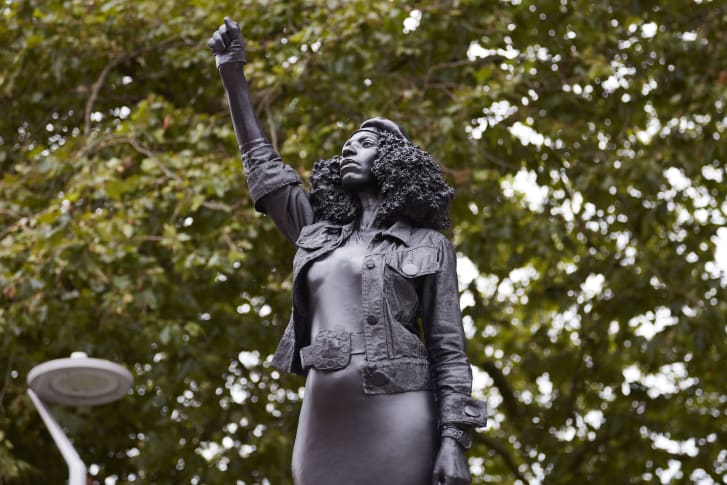Oscar Holland, CNN
Last month, Black Lives Matter demonstrators in Bristol, UK, made headlines around the world when they toppled a statue of 17th-century slave trader Edward Colston and dumped it into the River Avon.
Now, the city has an entirely new figure being celebrated on the once-empty plinth: a protester.
The statue was erected on a plinth once occupied by a statue of slave trader Edward Colston.
British artist Marc Quinn has erected a statue depicting a woman with her fist raised in a Black Power salute in the place where Colston once stood. He based the artwork on a photograph of Jen Reid, a Bristol resident who had climbed atop the empty plinth as she returned home from the demonstration in June.
Britain’s imperialist monuments face a bitter reckoning
After contacting Reid, the artist produced a life-sized sculpture of the moment using black resin. In a press statement released Wednesday, he said that the sculpture “is an embodiment and amplification of Jen’s ideas and experiences, and of the past, present and her hope for a better future.”
The statue placed where a monument to slave trader Edward Colston once stood.
“My friend … showed me a picture on Instagram of Jen standing on the plinth in Bristol with her fist in a Black Power salute,” he said. “My first, instant thought was how incredible it would be to make a sculpture of her, in that instant.
“It is such a powerful image, of a moment I felt, had to be materialized, forever. I contacted Jen via social media to discuss the idea of the sculpture and she told me she wanted to collaborate.”Jen Reid pictured alongside the statue.
The work, officially titled “A Surge of Power (Jen Reid) 2020,” is intended to be temporary. The artist confirmed that he did not receive permission from authorities to erect the statue. Should the artwork be sold, Quinn said that profits will be donated to two charities, chosen by Reid, that promote the inclusion of Black history in school curricula.
“Jen and I are not putting this sculpture on the plinth as a permanent solution to what should be there — it’s a spark which we hope will help to bring continued attention to this vital and pressing issue,” Quinn added.
What should our monuments of the future look like?”We want to keep highlighting the unacceptable problem of institutionalized and systemic racism that everyone has a duty to face up to. This sculpture had to happen in the public realm now: This is not a new issue, but it feels like there’s been a global tipping point.”
‘It was totally spontaneous’
In a press release published by Quinn’s studio, Reid recalled feeling an “overwhelming impulse” to climb onto the plinth following the protest, which drew an estimated 10,000 people to the streets of Bristol on June 7.
“When I was stood there on the plinth, and raised my arm in a Black Power salute, it was totally spontaneous, I didn’t even think about it,” she is quoted as saying. “It was like an electrical charge of power was running through me.”
Reid said that she agreed to collaborate with Quinn to help “keep the journey towards racial justice and equity moving.”
‘My emotions were so raw’: The people creating art to remember George Floyd”This sculpture is about making a stand for my mother, for my daughter, for Black people like me,” she continued. “It’s about Black children seeing it up there. It’s something to feel proud of, to have a sense of belonging because we actually do belong here and we’re not going anywhere.”
The original bronze statue had stood in Bristol’s city center since 1895, but had become increasingly controversial due to Colston’s role in the Atlantic slave trade. The sculpture faced petitions calling for its removal before. The statue pictured before it was lifted into place.
Days after the statue was toppled, street artist Banksy — who is believed to hail from Bristol — also proposed erecting a statue depicting an act of protest. He posted a sketch to his Instagram account alongside the explanation: “We drag him out the water, put him back on the plinth, tie cable around his neck and commission some life-size bronze statues of protesters in the act of pulling him down.”
the old
the new

